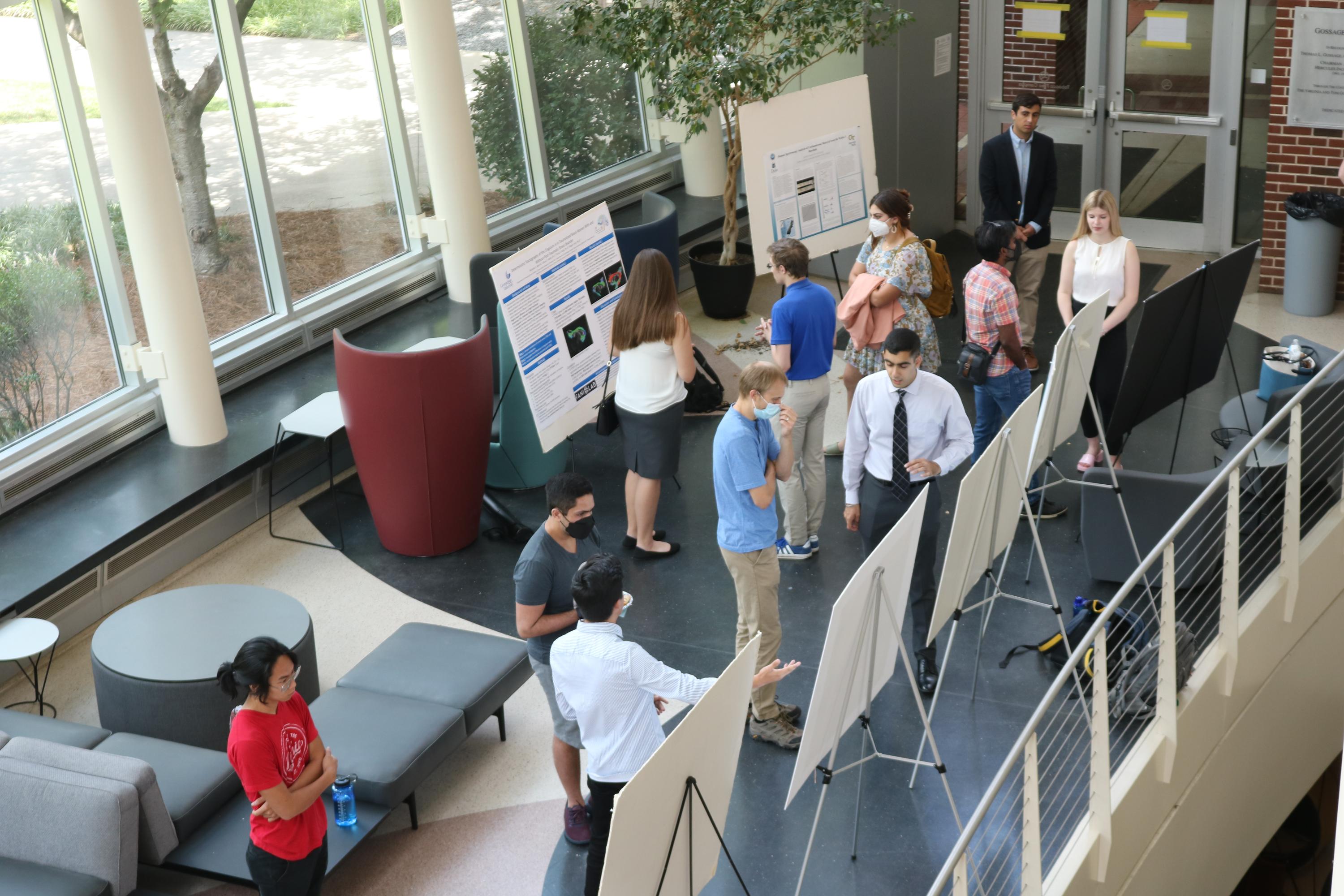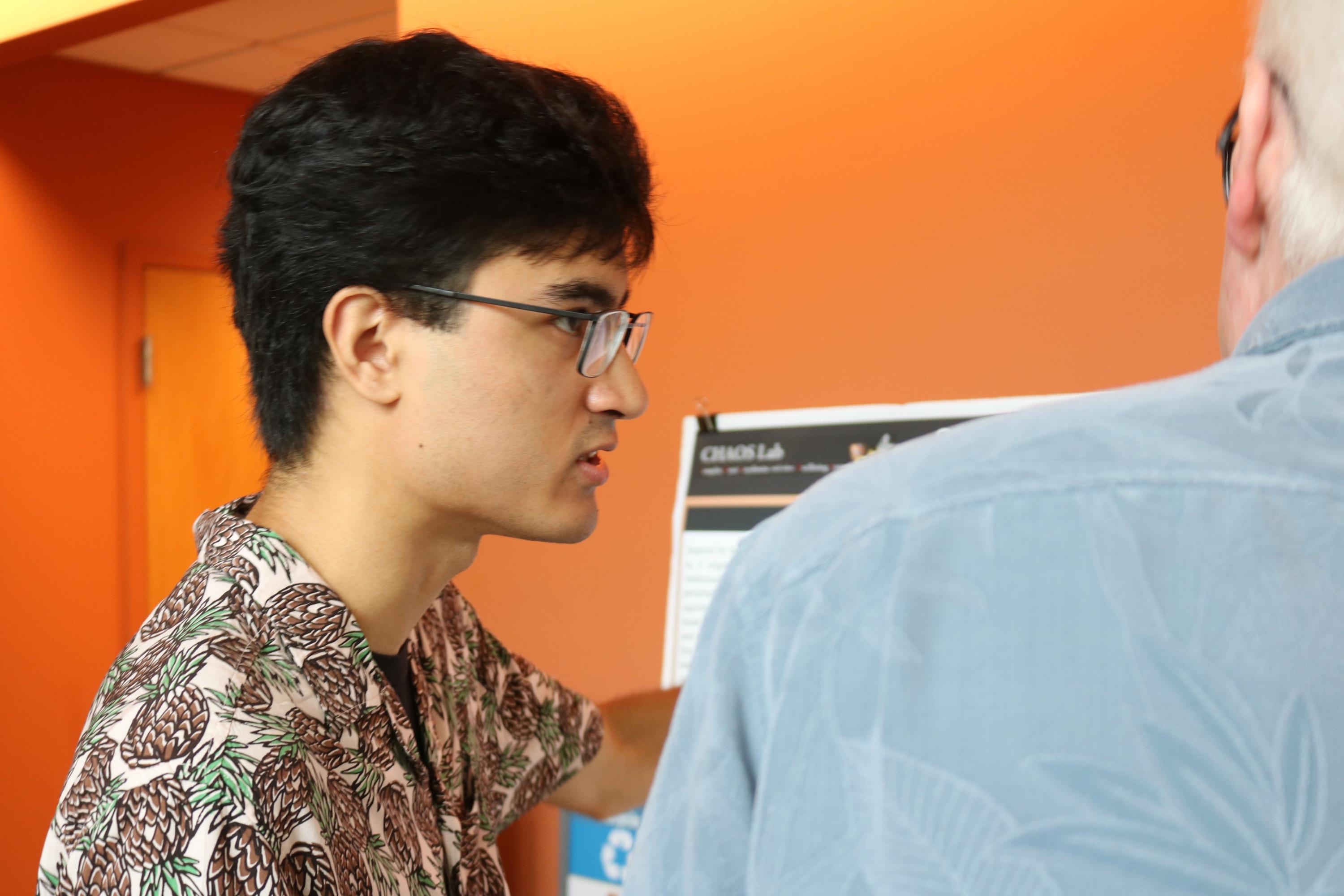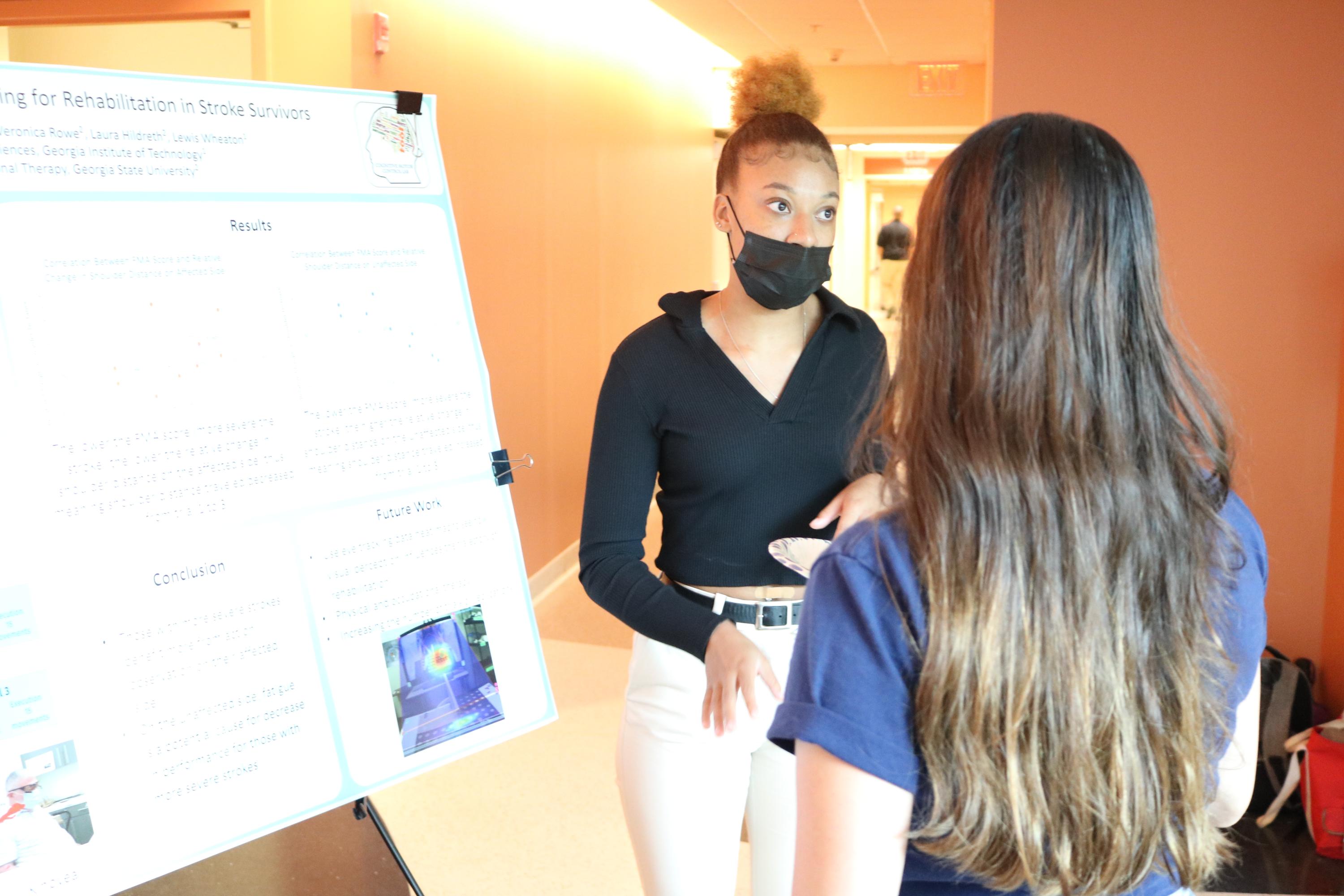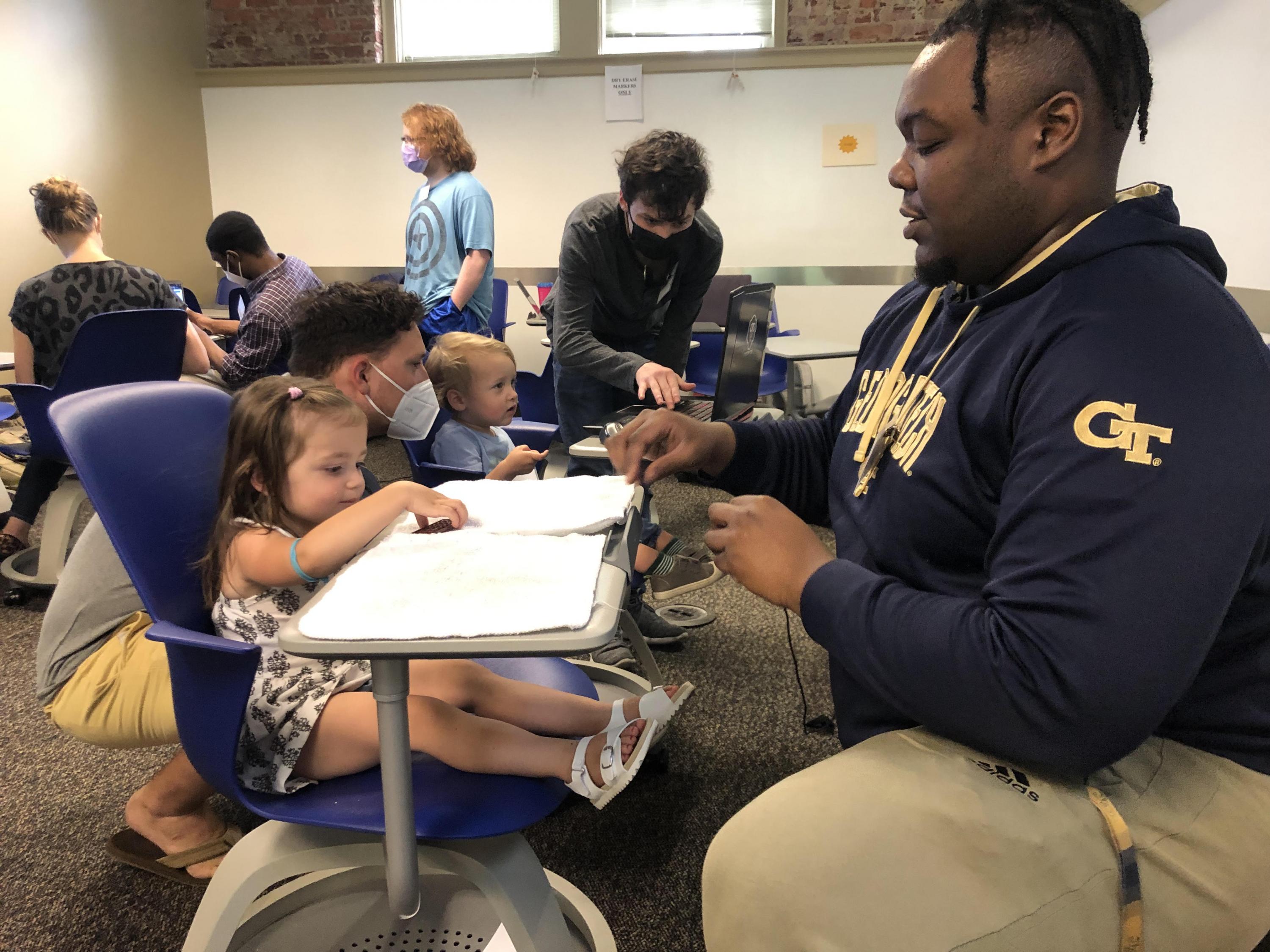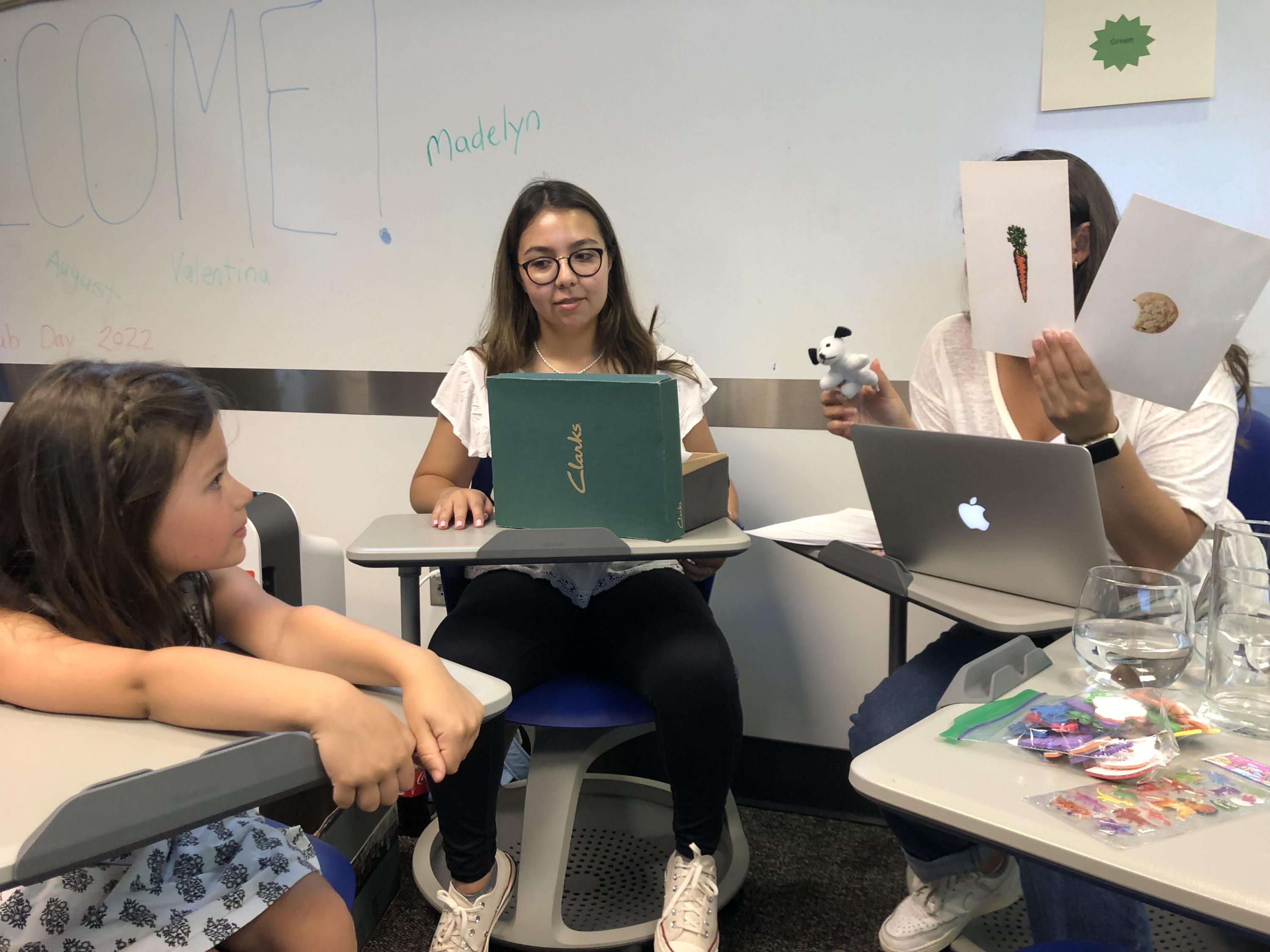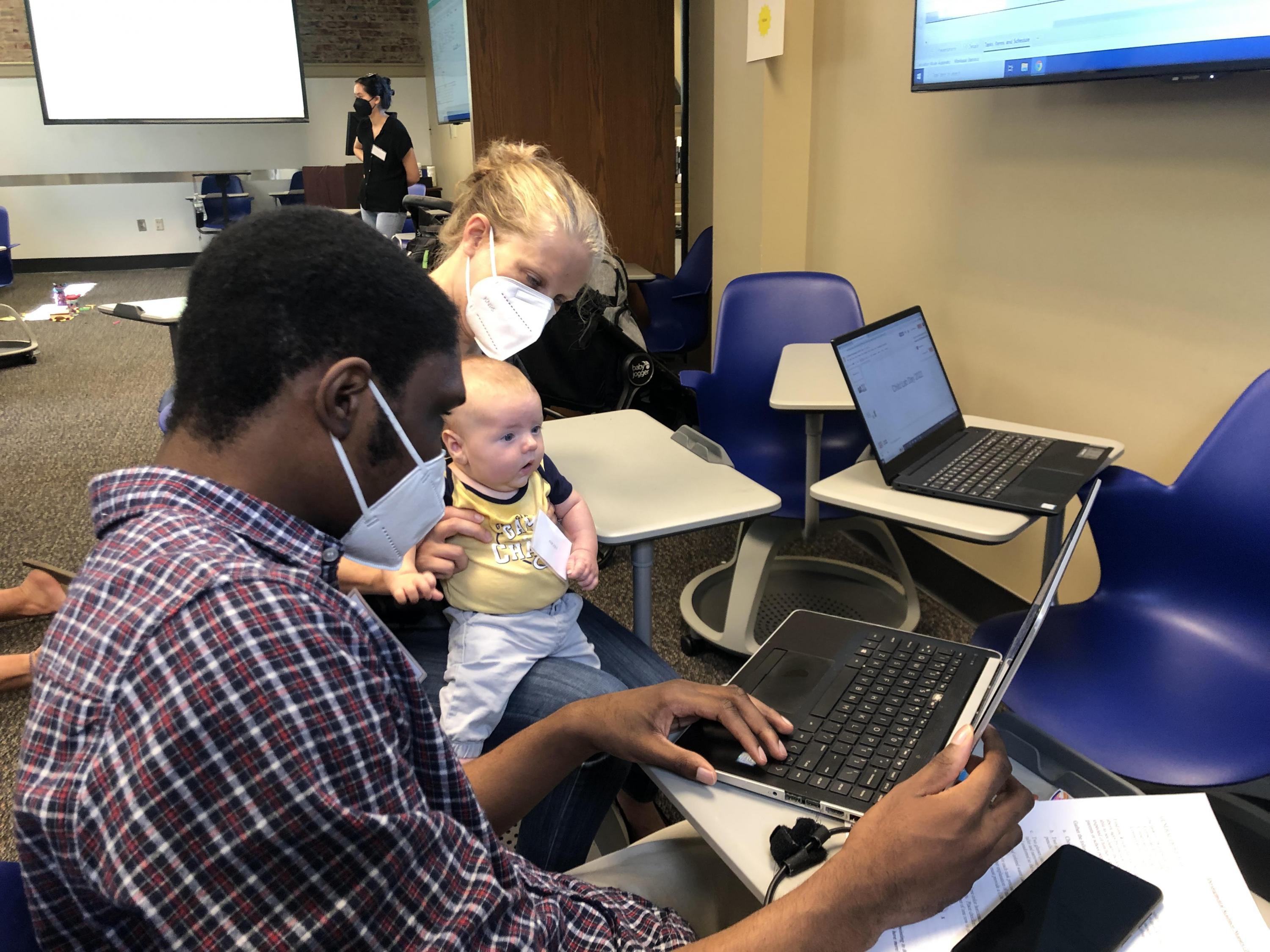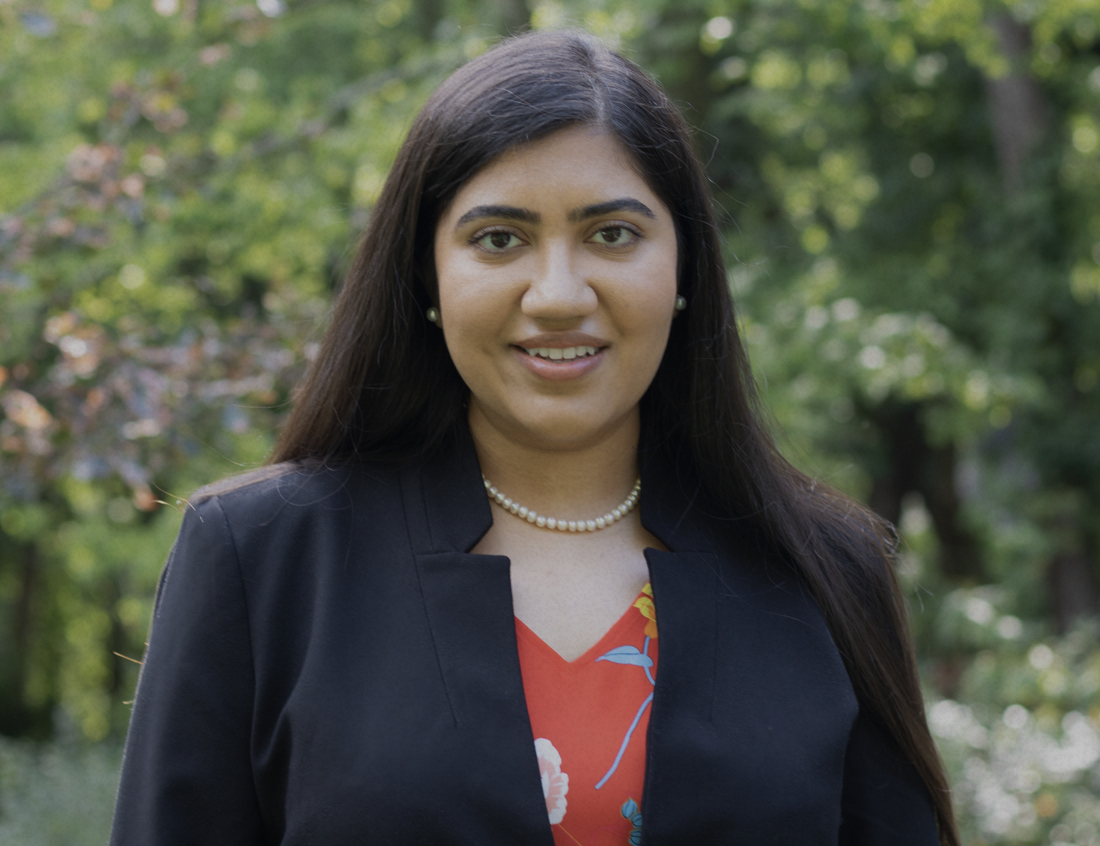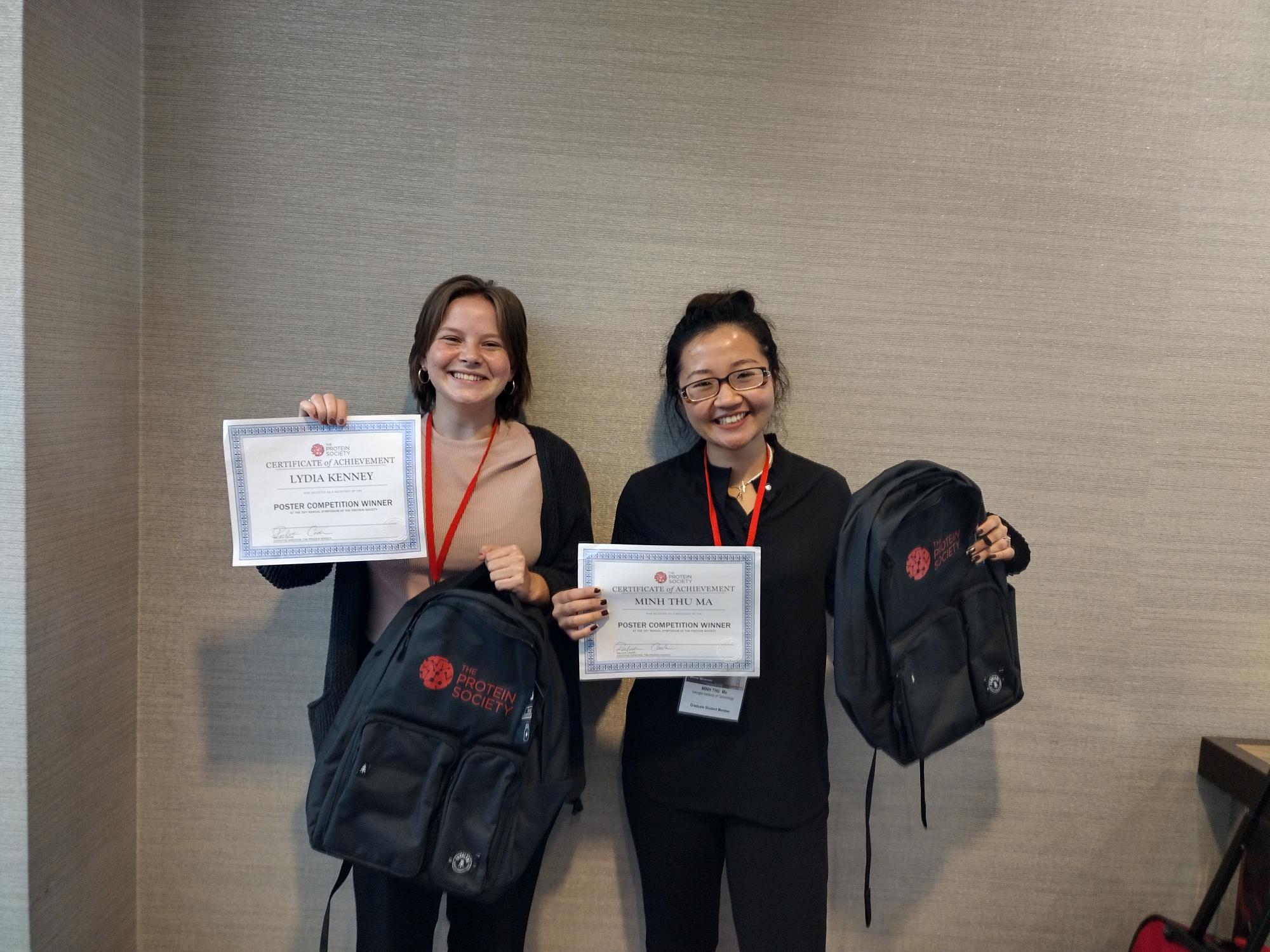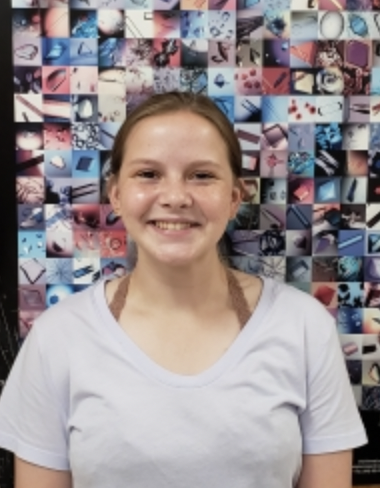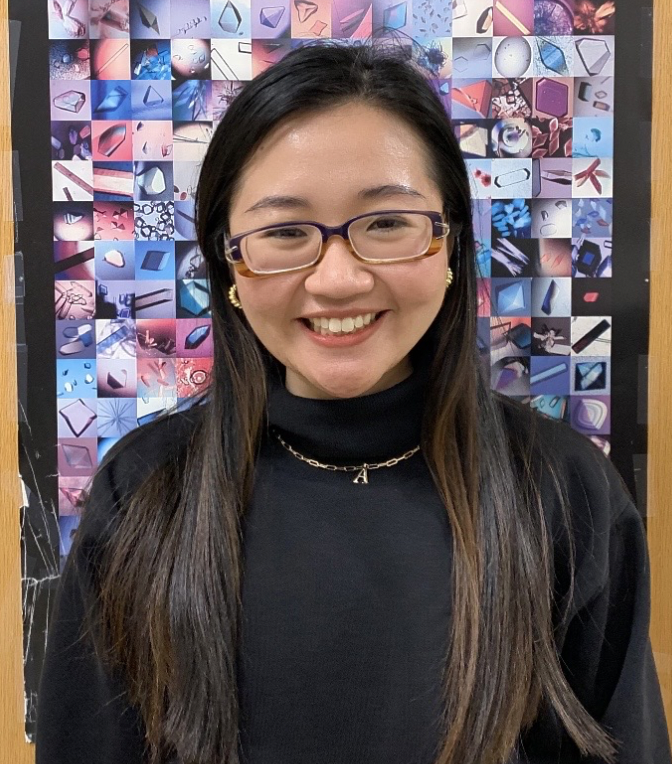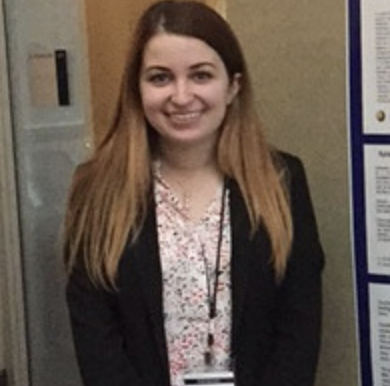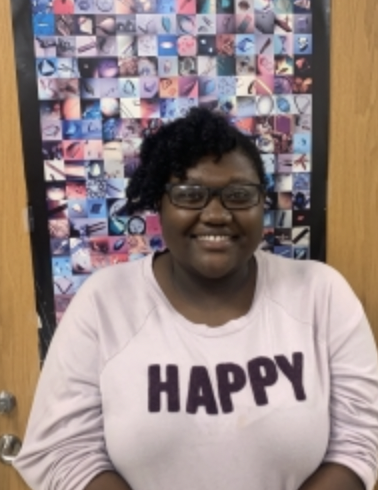As the mercury climbed across Atlanta this summer, student research heated up across the College of Sciences, thanks to special summer programs for undergraduates from around the globe that help undergraduates get a head start on research experience for STEM careers in academia, industry, and beyond.
This year’s initiatives included National Science Foundation Research Experiences for Undergraduates (NSF REU) programs, a new initiative to engage Georgia community college students, summer workshops in computational chemistry and quantitative biosciences, and more.
Through the workshops, students learned to navigate new methods of research that involve data analysis and computational aspects of disciplines like chemistry and biology — as well as communicate connections across concepts like group theory, topology, combinatorics, and number theory.
Meanwhile, the NSF REU programs across the College’s six Schools of Biological Sciences, Chemistry and Biochemistry, Earth and Atmospheric Sciences, Physics, Psychology, and Mathematics, as well as the Undergraduate Neuroscience Program, allowed early-year students to get their first taste of in-depth research with unique expertise and equipment available at Georgia Tech.
Other students took advantage of special fellowships to attend summer conferences in their chosen disciplines, where they networked with fellow young scientists and mathematicians while soaking up knowledge from peers and mentors.
Here’s a roundup of some of the 2022 summer undergraduate student research programs and events led by the College of Sciences at Georgia Tech:
The Summer Theoretical and Computational Chemistry (STACC) Workshop
Undergraduates eager to try calculations in areas such as quantum dynamics, electronic structure theory, and classical molecular dynamics — and who want to know more about new data science and machine learning tools — got their chance during this two-week early summer computational chemistry workshop.
“Theoretical and computational studies provide a necessary complement to experimental investigations because they are able to obtain the atomistic level of detail that is near impossible to probe with experiment,” said Joshua Kretchmer, assistant professor in the School of Chemistry and Biochemistry.
“It is becoming more and more routine to use these techniques, even outside of pure theory research groups, as computers have become more powerful and more easy-to-use software is being developed to perform these calculations,” Kretchmer said. “It is thus important for students to be exposed to these techniques early on in their undergraduate education so they have a basic understanding of how and when the slew of different computational techniques are best utilized.”
2022 was the first year for the STACC Workshop, and Kretchmer added that the students “seem to be engaged and excited by the material, both in terms of learning the technical skills necessary to utilize high-performance computers and the unique aspects that can be learned about chemical systems from computer simulations.”
Those thoughts were echoed by University of South Florida student Nicholas Giunto. “After simulating and calculating these various processes, I realized how theoretical chemistry can do so much more than just simulate these scenarios. This technique of chemistry can be used in many other fields of science as well,” Giunto said. “This workshop has broadened my perspective of chemistry, and taught me a whole new field of science that is innovative and prudent.”
For more information, check out the STACC website here.
Summer College Research Internship
Thanks to a grant from the Betsy Middleton and John Clark Sutherland Dean’s Chair, community college students in Georgia were paired up with a Georgia Tech College of Sciences lab — at no cost to the students — for the inaugural Summer College Research Internship (SCRI).
The idea for SCRI grew from Shania Khatri’s experiences conducting research for the first time. Khatri, a fourth-year Biological Sciences major scheduled to graduate in December 2022, began research in high school through a program at a local university that placed students, especially those historically underrepresented in STEM, in labs to complete their own summer research projects.
“I felt firsthand how important mentorship was in building confidence in STEM, promoting belonging, and ultimately influencing my decision to pursue higher education and research,” Khatri said. “Research shows that students who complete high school and undergraduate programs are more likely to pursue STEM majors and consider doctoral degrees, underscoring that mentorship early in careers can improve achievement and retention of these students.”
SCRI students helped design experiments, collected and analyzed data, and presented the results of their work. They worked closely with their Ph.D. student mentors, learning from them as well as the broader community of their host labs. They also heard weekly lectures from College of Science faculty as they learned about the broader research environment at Georgia Tech.
“The accepted students have strong scholastic potential, and we hope that we can excite them about the research happening at Georgia Tech and potentially recruit them to join our programs, either as transfer students or future graduate students,” said William Ratcliff, associate professor in the School of Biological Sciences and co-director of the Interdisciplinary Ph.D. in Quantitative Biosciences Program. Ratcliff also co-leads the SCRI with Todd Streelman, professor and chair of the School of Biological Sciences at Tech.
Three students from two-year community college programs in Georgia were chosen for the inaugural SCRI, Ratcliff said. With diverse interests, all three researched in labs within the Center for Microbial Dynamics and Infection (CMDI).
“While this was not part of our review criteria, two of the three students are members of groups that are underrepresented in science according to National Institutes of Health criteria, so this is a great opportunity to broaden participation in academic research,” Ratcliff added.
“When discussing diversity in STEM and retention of underrepresented minorities, community college students should be at the forefront of the discussion,” Khatri said. “It is my hope that through this program the students will gain confidence in their own abilities, and learn skills of science communication, data analysis, critical thinking, collaborative work, and problem solving that will aid them in any career path.”
More information on the Summer College Research Internship is available here.
Child Lab Day
Child Lab Day is the capstone assignment for students in the School of Psychology course PSYC 2103 Human Development. Christopher Stanzione, senior lecturer and associate chair for undergraduate studies for the School, said his students conducted cognitive, language, and conceptual assessments in June on children ranging in age from four months to nine years old.
“This is a great applied experience for the Georgia Tech students,” Stanzione said. “All semester we study these concepts, but to see development in action is special. They’ll likely see the gradual change between concepts by administering the assessments to kids of different ages.”
The first Child Lab Day was in 2019. This summer, students majoring in psychology, biomedical engineering, computer science, biology, neuroscience, and economics took part in this second one. “They loved it,” Stanzione said.
National Science Foundation Research Experiences for Undergraduates (NSF REUs)
For the first time, this year all six schools across the College of Sciences — plus the Neuroscience program at Tech — led Research Experiences for Undergraduates, a National Science Foundation initiative.
Each student was associated with a specific research project, and worked closely with school faculty and other researchers. Students were given stipends and, in many cases, assistance with housing and travel to help cover the experience.
“Since most of the undergraduate participants are recruited from institutions that do not have extensive research infrastructure, the immersive research experience available to them in these programs can be transformational,” said David Collard, professor and senior associate dean in the College, who previously led the REU program in the School of Chemistry and Biochemistry for more than a decade.
“A measure of success of the REU programs in the College of Sciences is that many of the undergraduate participants subsequently go on to complete their Ph.D., some at Georgia Tech, and others elsewhere,” Collard added.
The following are the details for each College of Sciences school’s REU program. Learn more about future Summer Research Programs for Undergraduates here.
School of Earth and Atmospheric Sciences REU:
Georgia Tech Broadening Participation in Atmospheric Science, Oceanography, and Geosciences
Working under the supervision of a School of Earth and Atmospheric Sciences (EAS) faculty member, participants focused on a single research project, but also gained a broad perspective on research in Earth and atmospheric sciences by participating in the dynamic research environment. This interdisciplinary REU program had projects ranging from planetary science to meteorology to oceanography. In addition to full time research, undergraduate researchers participated in a number of professional development activities, seminars with faculty and research scientists, presentation and research poster symposiums, and social activities with other summer REU students.
Schools of Biological Sciences, Chemistry and Biochemistry, Civil and Environmental Engineering, Chemical and Biomolecular Engineering REU:
Aquatic Chemical Ecology (ACE) at Georgia Tech
The Aquatic Chemical Ecology REU gave students the opportunity to perform research with faculty from five Georgia Tech schools.
Students participated in research with one or more faculty members, learned about careers in science and engineering, and saw how scientists blend knowledge and skills from physics, chemistry, and biology to investigate some of the most challenging problems in environmental sciences.
This was the first REU experience for Jenn Newlon, a rising senior at the University of North Carolina Wilmington. In fact, “I’d actually never heard of an REU before I came here,” she said. “It’s been a really good experience. I never really saw this side of research in my institution. While I did get to do undergraduate research, it was more of, ‘do this in a lab, this is what happens.’ I had to present my findings every week to my PI (principal investigator), who gave really good feedback. And all the people in my lab were really kind and helpful.”
Schools of Psychology, Biological Sciences REU:
Neuroscience Research Experience for Undergraduates
The first week of the inaugural Neuroscience/Psychology REU was a Neuroscience Bootcamp, where students engaged in hands-on activities to learn about brain anatomy, functional magnetic resonance imaging (fMRI), encephalography, and other techniques. Then the student researchers spent time working on projects in the laboratories of mentors in either the School of Psychology, School of Biological Sciences, or with researchers at Georgia State University. They also attended professional development and social activities with other REU students.
“There is tremendous interest in neuroscience, and we have seen an incredible expansion of technology in our ability to record from the human nervous system,” said Lewis Wheaton, associate professor in the School of Biological Sciences and co-director of the Neuroscience/Psychology REU.
“At the same time, many students do not have access to these technologies at their academic institutions because of expense,” Wheaton said. “We feel that it is vital to ensure that students who do not have access to these technologies at their universities get exposure to the tools and approaches to understand the human brain. I am excited to further focus on providing opportunities for women and underrepresented minorities to engage in this research.”
A unique feature of the Neuroscience REU program is that it allows some students to come back for a two-year experience, “which can really provide a great opportunity to enhance their research, and put these students in a stronger position to advance their careers,” Wheaton added.
“It is also great that we can show them the research and educational environment at Georgia Tech and in the broader Atlanta area,” said Eric Schumacher, professor in the School of Psychology and co-director of the Neuroscience/Psychology REU. “This is an opportune time to showcase our two schools and the Institute, given that both schools are working with the College and Institute to offer a cross-disciplinary Neuroscience Ph.D. program soon.”
That was the impression that Alexa Toliver came away with. The fourth year student at Arizona State University is majoring in neurobiology, “but I always wanted to do neuroscience research,” she said during the recent REUs poster session at the Ford Environmental Science and Technology Building. “It was a little new, but it was a great opportunity and I never felt uncomfortable with any of the topics. This was the only neuroscience REU that I could find, and I applied to it and I got it, so I was excited.”
School of Physics REU:
Georgia Tech Broadening Participation in Physics
Working under the supervision of a physics faculty member, participants focused on a single research project but also gained a broad perspective on research in physics by participating in the dynamic research environment.
Available projects for the REU spanned the field of physics ranging from quantum materials, quantum simulation/sensing, astrophysics, physics of living systems, and non-linear dynamics.
In addition to full time research, undergraduate researchers participated in a number of professional development seminars, research horizon lunches, and social activities with other summer REU students.
Brendan D’Aquino, a rising senior at Northeastern University in Boston, had planned to use his computer science background to get an industry job after graduation. Then he attended the 2022 School of Physics REU.
“After doing an internship last year at a software company that does physics, I kind of realized I wanted to make the switch,” D’Aquino said. “So I applied to the program. I got to work here. And I thought it was super cool. So this was my first time doing research. I kind of had grad school in the back of my mind for a while. But 10 weeks here kind of makes me more sure that I want to get into that in the future.”
The School of Mathematics has a rich tradition of offering summer undergraduate research programs. The projects have been mentored by faculty and postdocs covering a range of topics, such as graph coloring, random matrices, contact homology, knots, bounded operators, harmonic analysis, and toric varieties.
Previous Math REU students have published many papers, won a number of awards, and have been very successful in their graduate school applications.
“The main purpose of our REU is to give students research experience which should help them decide if they want to do math research for a living, and in particular, go to a math grad school,” said Igor Belegradek, professor and director of Teaching Effectiveness in the School of Mathematics. Belegradek also coordinates the Math REU. “Also, if there is a publication or poster at a conference, their grad school application will definitely become more competitive.”
Sometimes that application is sent to Georgia Tech. “We did have a few students who were accepted to our grad school after attending an REU with us,” Belegradek said. “It definitely helps put Georgia Tech Mathematics on the map. This summer we have 22 REU students, and only two of them are from Georgia Tech.”
Mathematics topics for the 2022 REU included aspects of graph coloring, Legendrian contact homology, Eigenvectors from eigenvalues and Gaussian random matrices, and applications of Donaldson's Diagonalization theorem.
Read more about the 2021 Mathematics REUs here.
In July, the School of Mathematics also hosted its biennial Topology Students Workshop, organized by Professor Dan Margalit since 2012.
Events included a public lecture on campus, “Juggling Numbers, Algebra, and Topology”, accessible for curious people of all ages and backgrounds.
“One goal of mathematics is to describe the patterns in the world, from weather to population growth to disease transmission,” event organizers said. The workshop used mathematics to describe juggling patterns, count the different kinds of patterns, and create new patterns, “making surprising connections to group theory, topology, combinatorics, and number theory.”
The 36th Annual Symposium of the Protein Society
From microproteins, protein condensates, synthetic biology and biosensors, to the latest developments in machine learning and imaging technologies, to addressing health disparities, the Protein Society Symposium, held in San Francisco in early July, provided a state-of-the-art view of the most exciting areas of research in biology and medicine.
Four students of Raquel Lieberman’s School of Chemistry and Biochemistry lab attended, thanks to Protein Society travel fellowships:
Lydia Kenney, fourth-year undergraduate and Beckman Scholar in the Lieberman lab. Kenney was also selected to give an oral presentation in a dedicated session to undergraduates
Minh Thu (Alice) Ma, fourth-year Ph.D.student
Emily Saccuzzo, fourth-year Ph.D. student
Gwendell Thomas, first-year Ph.D. student
Kenney and Ma won Best Poster awards at the symposium, and Saccuzzo won an honorable mention.
“The conference was amazing! We saw so many great speakers and presentations about protein science, and it was a great way to meet scientists from all over the world,” Kenney said. “I’m so grateful for this experience, especially as I begin to apply to graduate school and think about my future career in science. It was a great experience, and one that has truly deepened my appreciation for science and research.”
“To have each of these superstars selected for travel fellowships puts them in an elite cohort of trainees at this 500-plus person meeting,” Lieberman said. “I am so excited for them to present their thesis research and to get feedback from colleagues in our field from all over the world. I’m sure new ideas, collaborations, and other opportunities will emerge from this experience. It’s just the boost they and I need after a challenging couple of years as experimental biochemists.”
For More Information Contact
Writer: Renay San Miguel
Communications Officer II/Science Writer
College of Sciences
404-894-5209
Editor: Jess Hunt-Ralston

